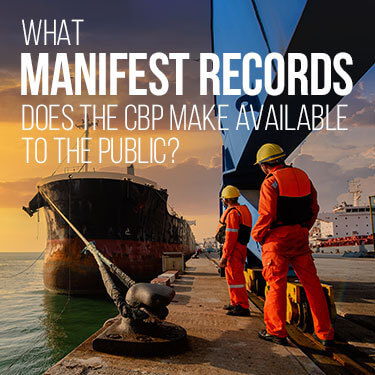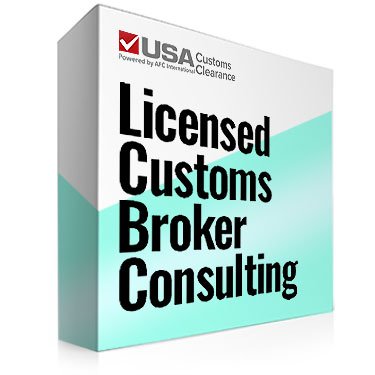A CBP confidentiality request is the first step to making sure your company's private information stays private. You can likely keep a secret. But when protecting business interests, keeping some information confidential might not be up to you. Certain laws mean that you need to take an extra step to protect import information.
The Freedom of Information Act (FOIA) states any citizen may request information from government agencies. Data mining services can submit requests to the Customs and Border Protection (CBP) agency for shipping manifest records of any company on record. A CBP Confidentiality Request denies access in spite of FOIA requests.
Learn more about CBP confidentiality requests and see how they can impact your business.
A CBP confidentiality request is a way to protect your import records from public viewing. For now, the CBP only releases the manifests of imports brought in by ocean carriers. Importers who only use air carriers don’t need to worry. The CBP doesn’t release air cargo manifests even if companies haven’t filed for confidentiality.
The CBP can hide a company’s import records if they submit an Electronic Vessel Manifest Confidentiality request. Protecting this data is important for a successful business.
The government does prevent open access to vessel manifest data to protect sensitive data. There are laws such as 19 CFR 103.3 that say only authorized groups can make import record requests. This law is also what allows importers and consignees to file for confidentiality. Even if those groups ask for your data, it can be kept hidden.
Suppliers can also use this same law to protect information about the ports they use.
There are businesses that use the FOIA for commercial purposes. Spying on other businesses, legal or not, is bad for many reasons. The U.S. government came up with a series of exemptions in the 1980s to protect businesses when they realized what was going on.
Since 1982, Exemption (b) (4) allows the CBP to refuse requests for commercial or financial information if a company makes an official request. Together, with other regulations, businesses now have a way to keep a few secrets.
Companies can appeal, but most won’t bother. Data requests cost money. Appeals would cost them even more. Data mining companies take advantage of the fact that many businesses simply don’t bother with or don’t know how to keep their records hidden.
Filing for confidentiality was hard at first. Applicants had to send paper requests by mail, or could use email later on. Either way, processing the request took up to 90 days before confidentiality was confirmed. Making changes to your information was just as time-consuming.
A fully online application became available for all businesses in May 2020.
The introduction of an online application is significant because data service companies were taking advantage of the government’s slow processing times, especially as the internet became more widespread. Such companies publish regular information updates that anyone with wifi can access.
The online application system cut down the processing time to 24 hours. Awareness of the process has grown, so importers and shippers can take advantage of it.
Even with fewer delays, however, it's still recommended for confidentiality renewal requests to be completed 60-90 days prior to expiration.

Federal regulations state the CBP can’t make any import records available to the general public. Some companies get special permission though. For a fee, these companies can make a request to the CBP’s ITRAC (Importer Trade Activity) system.
Companies making an official ITRAC request to the CBP can get information on 26 different data points going back five years. A sample request can be found on the CBP’s website.
Some of the manifest information available includes:
Your shipping manifest has everything competing businesses might use to find your suppliers, product quantity orders, and what you paid for it. Protecting your supply chain becomes virtually impossible.
When data mining, companies send requests. The CBP sends the data through email or by supplying a manifest disc (a CD with the information on it). Once companies have the data, there’s nothing stopping them from making it public knowledge.
Companies like Panjiva and ImportGenius sell that data through a subscription service. Others, like ImportYeti, make it available for free.
Let’s take a closer look at some of the data available through one of the free sites, ImportYeti. Along with tracking over 70 million U.S. ocean vessel records, they also track what industries are looking for information.
| Industry | Percentage of Users |
| Logistics Companies | 32.2% |
| Importers | 37.7% |
| Suppliers | 25.6% |
| Market Researchers | 4.5% |
This is a site that gets an average of 230 thousand visitors a month and it’s only one example of such a site. No matter what, it’s bad for your business secrets.
Be aware of all the documents needed for import and export and what information is on them.
Filing for a CBP Confidentiality Request hides all 26 data points available for request per the FOIA. A data mining service can make the request, but the information from the CBP will be blank. Your information is redacted from the record.
The eCommerce industry has made data mining services more in demand than ever. Competition in the eCommerce industry is intense because there are so many options to choose from. Even small bits of data can make a big difference.
Supplier information and delivery records are kept private. You’re protected from competitors online looking to scoop your suppliers. You’re also better protected against a random dock worker looking for a quick payday.
CBP does warn users that they can’t guarantee the information will never get published. After confidentiality becomes effective, it's only good for two years. You need to renew your application before the expiration of the current approval to continue protection.
Related: CBP Clearance Process: A Guide for Importers

CBP provides importers, consignees, and shippers with an online application through their website. It’s a simple four-step process. Submit your company name, address, and U.S. EIN (Employer Identification Number) to identify the business the request is for.
An easy online application means you no longer have to submit through mail or email. Requests go through faster, which means confidentiality is granted faster.
A request for confidentiality is only effective if you provide accurate information on the form itself. When entering the name, include the Automated Commercial Environment (ACE) designation being used by your carrier. The name should also match the importer or consignee exactly.
Make sure the mailing address has also been entered correctly - especially if you have multiple locations. Use the address most associated with your business.
At the end of the application, there is a place to enter name variants. Enter any different spellings, common misspellings, or DBAs (doing-business-as) you use. Over 50 variants can be entered. The more you include, the fewer chances competitors are going to get to find your data.
USA Customs Clearance works with import consultants who can navigate the application on your behalf and ensure renewals are taken care of automatically.
Prices for goods and transport keep going up. More than ever, you need to protect your import data. No matter your business experience, partner with USA Customs Clearance to help.
Experienced Customs Brokers are available who can complete a CBP confidentiality request for you. Get peace of mind about your supply chains. Stay protected from the moment you order products to the time they arrive in your customer's hands.
Make USA Customs Clearance your company’s import partner and see all the services we offer. Get the help you need for:
Keep secrets hidden where they belong. Find out how to complete a CBP confidentiality request. Talk to a Licensed Customs Broker today, or take advantage of our easy-to-use site for automatic service.

 Copy URL to Clipboard
Copy URL to Clipboard
Add your first comment to this post